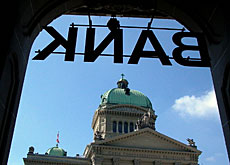German scandal puts tax havens in spotlight

A massive German tax evasion investigation centring on Liechtenstein has brought unwanted attention to other wealth havens, such as Switzerland.
Switzerland is not implicated in the German probe even though a Munich branch of the UBS bank was raided as investigators sought evidence on a client. However, Swiss banks have long been accused of harbouring undeclared riches.
The tax scandal currently gripping Germany has claimed the job of former Deutsche Post boss Klaus Zumwinkel, who was arrested and accused of tax evasion amounting to €1 million (SFr1.6 million). Authorities said the net could widen to several hundred suspects and hundreds of millions of euros.
The Organisation for Economic Cooperation and Development (OECD), of which Switzerland is a member, offered a damning verdict on non-transparent haven states.
“Excessive bank secrecy rules and a failure to exchange information on foreign tax evaders are relics of a different time and have no role to play in the relations between democratic societies,” Secretary-General Angel Gurría stated.
OECD spokesman Nicholas Bray told swissinfo that member countries have long asked Switzerland to conform to standard practices.
“Switzerland operates strict banking secrecy that some of the other OECD countries are concerned about because it impedes their investigations into tax dodging. They have been saying for time that Switzerland should join them in being prepared to exchange information for the purposes of tax enforcement,” he said.
The Swiss non-governmental organisation Berne Declaration has campaigned against the country’s tax haven status for many years.
“We are grateful that such a scandal has shed light on tax evasion. The house of cards is about to topple in Liechtenstein and hopefully in Switzerland as well,” spokesman Oliver Clarssen told swissinfo.
No crime
Tax evasion is not a criminal offence in either Switzerland or Liechtenstein, but both countries cooperate with other states that provide proof of fraud.
But this is not enough for the anti-corruption organisation Transparency International. “Tax evasion must become a criminal offence in Liechtenstein and Switzerland. [They] must give up banking secrecy for European citizens,” said Caspar von Hauenschild of the German branch.
Switzerland and Liechtenstein point to the introduction in July 2005 of a withholding tax on savings accounts held by European Union citizens. Under this arrangement, a 15 per cent levy is taken from interest earned on them and distributed to EU countries unless clients can prove they already pay the tax in their home country.
For now, the Swiss authorities and financial community are distancing themselves from events in Germany and Liechtenstein.
“To our knowledge, Switzerland is not connected with these events,” the Swiss finance ministry stated. The Swiss Bankers Association had the same message, while German prosecutors would not say if any investigations were being carried out in Switzerland.
But as the German investigation gathers momentum, criticism of offshore tax havens may intensify further.
swissinfo, Matthew Allen
A large scale investigation into alleged tax evasion was launched in Germany this month after the country’s intelligence service paid €5 million (SFr8 million) for confidential banking records relating to a wealth management group in Liechtenstein.
The records, containing details of German customers, were stolen from Vaduz-based LGT Treuhand in 2002.
On February 14, Deutsche Post boss Klaus Zumwinkel was arrested and charged with tax evasion. He later resigned from his position.
On Tuesday, a Munich branch of Switzerland’s biggest bank, UBS, was raided by investigators. They said the bank itself was not under suspicion, but they were seeking evidence on a client.
Liechtenstein has protested at Germany’s use of stolen banking details. Crown Prince Alois has threatened to take legal action against Germany.
The principality’s Prime Minister Otmar Hasler met German Chancellor Angela Merkel to discuss the issue on Wednesday. Merkel called on the principality to show greater cooperation with the OECD in preventing tax fraud.
Tax evasion is not the only area of dispute Switzerland has with European neighbours over its tax policy.
Several countries, including France and Germany, have expressed disapproval at the practice of offering tailor made low tax rates for wealthy individuals to entice the rich to move from their home countries to Switzerland.
This reached a head a year ago when French rock legend Johnny Hallyday said he would move to Switzerland to avoid high taxes in his own country.
Switzerland and the EU have also been in dispute for the last two years about tax breaks for foreign holding companies. Taxes are waived on earnings generated by these firms outside of Switzerland. The EU calls this an anti-competitive practice that violates the 1972 Free Trade Agreement.

In compliance with the JTI standards
More: SWI swissinfo.ch certified by the Journalism Trust Initiative











You can find an overview of ongoing debates with our journalists here . Please join us!
If you want to start a conversation about a topic raised in this article or want to report factual errors, email us at english@swissinfo.ch.